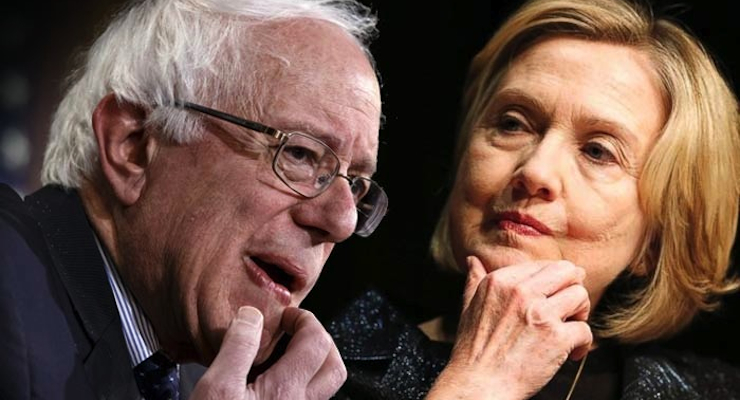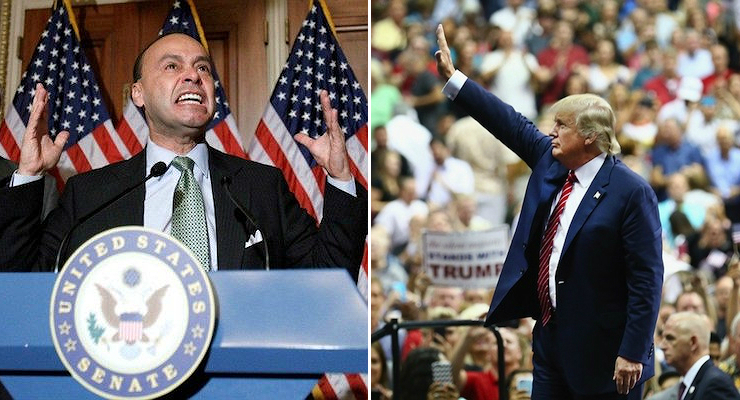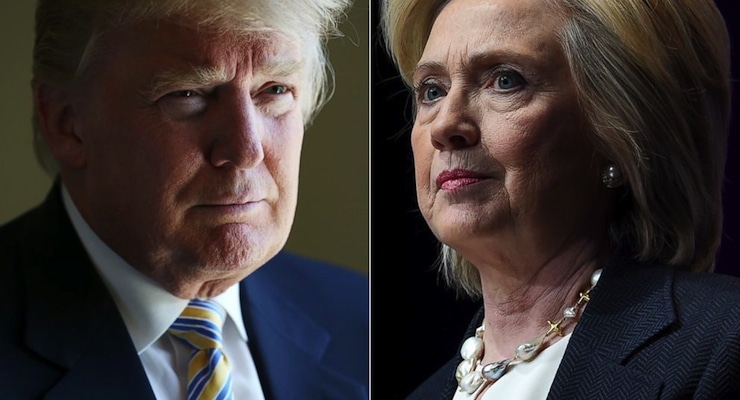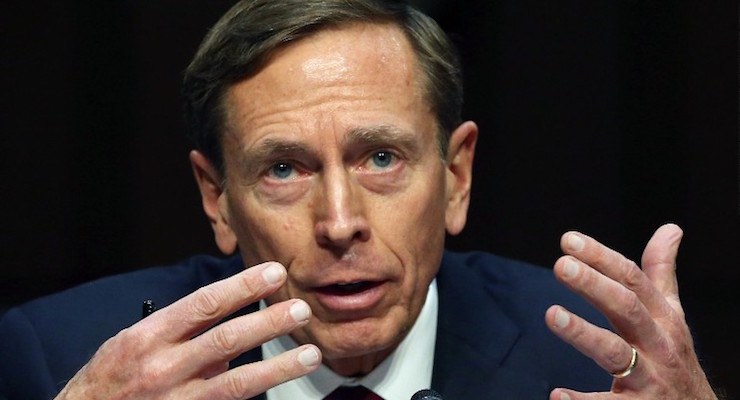
Vermont socialist Sen. Bernie Sanders, left, and former Secretary of State Hillary Clinton, right. (Photo: AP)
What’s the difference between Hillary Clinton andBernie Sanders? I suspect that most people would cite differences in personal ethics, but I’m a policy wonk so I actually think the leading candidates for the Democratic presidential nomination are two peas in a pod.
The only real difference is that Sanders is more open about his statist beliefs and is more anxious to adopt bad policies as quickly as possible.
But since I don’t want to become Greece, I have a hard time being impressed by politicians who bicker about the best route and best speed to get to the wrong destination.
Consider, for example, their views on corporate taxation. And let’s look specifically at the issue of how to deal with corporate inversions.
First, some background. The Wall Street Journal opines about the logical argument – and fiduciary obligation – for companies to escape America’s awful corporate tax system.
A major U.S. company merges with a foreign firm in part to avoid America’s punishing corporate tax code, and the politicians who refuse to reform the code denounce the company for trying to stay competitive. …Sigh. …Let’s try to explain one more time why it makes perfect business—and moral—sense… The U.S. federal corporate income tax rate is 35%. The Irish rate is 12.5%. …A CEO obliged to act in the best interests of shareholders cannot ignore this competitive reality.
All this makes great sense, and I’ve made similar arguments.
But what do Sanders and Clinton think? Well, the editorial skewers the two leading Democratic candidates for their vacuous demagoguery.
…none of this business logic impresses Hillary Clinton or Bernie Sanders, who helped to write the U.S. tax code as Senators but are now competing as presidential candidates to see who can demagogue more ferociously against American employers. …Neither one wants to reform the tax code to make U.S. tax rates more competitive with the rest of the world. Instead they want to raise the costs of doing business even further. Mrs. Clinton’s solution is to raise taxes on investors with higher capital-gains taxes, block inversion deals, and apply an “exit tax” to businesses that manage to escape. Mr. Sanders would go further and perform an immediate $620 billion cashectomy on U.S. companies. The Vermonter would tax the money U.S. firms have earned overseas, even though that income has already been taxed in foreign jurisdictions.
Call me crazy, but I don’t think the ideas being peddled by Clinton and Sanders will lead to more and better jobs in the United States.
Which is why, when given the chance to write about this topic for Fortune, I suggested that it would be best to actually fix the tax code rather than blaming the victim.
Some U.S. politicians respond to these mergers with demagoguery about “economic treason,” but that’s silly. These corporate unions are basically the business version of a couple in a long-distance relationship that decides to live where the economic outlook is brighter after getting married. So instead of blaming the victims, the folks in Washington should do what’s right for the country by trying to deal with the warts that make America’s tax system so unappealing for multinational firms.
And what are those warts?
The same ones any sensible person would identify. First, America’s corporate tax rate is absurdly anti-competitive.
With a 35% levy from Washington, augmented by smaller state corporate taxes, the combined burden is more than 39%. In Europe, by contrast, the average corporate tax rate has now dropped below 24%. And the average corporate rate for Asia’s major economies is even lower.
Second, we have a peculiarly self-destructive practice of wanting to tax income earned in other countries.
…the IRS also imposes tax on income earned in other nations. Very few nations impose a system of “worldwide taxation,” mostly for the simple reason that the income already is subject to tax in the nations where it is earned.
 So here’s the bottom line.
So here’s the bottom line.
The combination of a high rate and worldwide taxation is like a one-two punch against the competitiveness of U.S.-domiciled firms, so it’s easy to understand why inversions are so attractive. They’re a very simple step to protect the interests of workers, consumers and shareholders. …Let’s hope politicians put aside class warfare and anti-business demagoguery and fix the tax system before it’s too late.
By the way, even a columnist for the New York Times agrees with me. He has a piece on the inversion issue that is not very favorable to companies, and it certainly reads like he’s in favor of governments having more money, but he can’t help but come to the right conclusion.
Ultimately, the only way inversions will stop is when the corporate tax code changes so it becomes more attractive for American companies to be American companies.
And I can’t resist closing with a great blurb from George Will’s most recent column.
Having already paid taxes on it where it was earned, the corporations sensibly resist having it taxed again by the United States’ corporate tax, the highest in the industrial world.
Amen.
Will succinctly brings together the two most important things to understand about this issue. First, the income earned by American companies in other nations already is subject to tax, and, second, companies understandably don’t want it taxed again by the world’s highest corporate tax rate.
P.S. I’ve made the serious point that Sanders isn’t really a socialist, at least based on his voting record and what he proposes today. Instead, he’s just a conventional statist with mainstream (among leftists) views about redistribution.
Yet because he calls himself a socialist, that leads to amusing moments when other Democrats are asked to identify how he’s different. I’ve already mocked Debbie Wasserman Schultz for her inability to answer that question.
Now let’s see Hillary Clinton dance and dodge. The parts worth watching are all in the first half of the video.
[brid video=”24184″ player=”2077″ title=”Hillary Clinton Unable Refuses to Explain Difference Between Democrats and Socialists”]
Too bad Chris Matthews didn’t actually press her to answer the question. Though I’m vaguely impressed that she actually knows there are such a thing as libertarians.
P.P.S. While Hillary is clueless, there’s another Clinton that actually has some semi-sensible views about corporate taxation.










